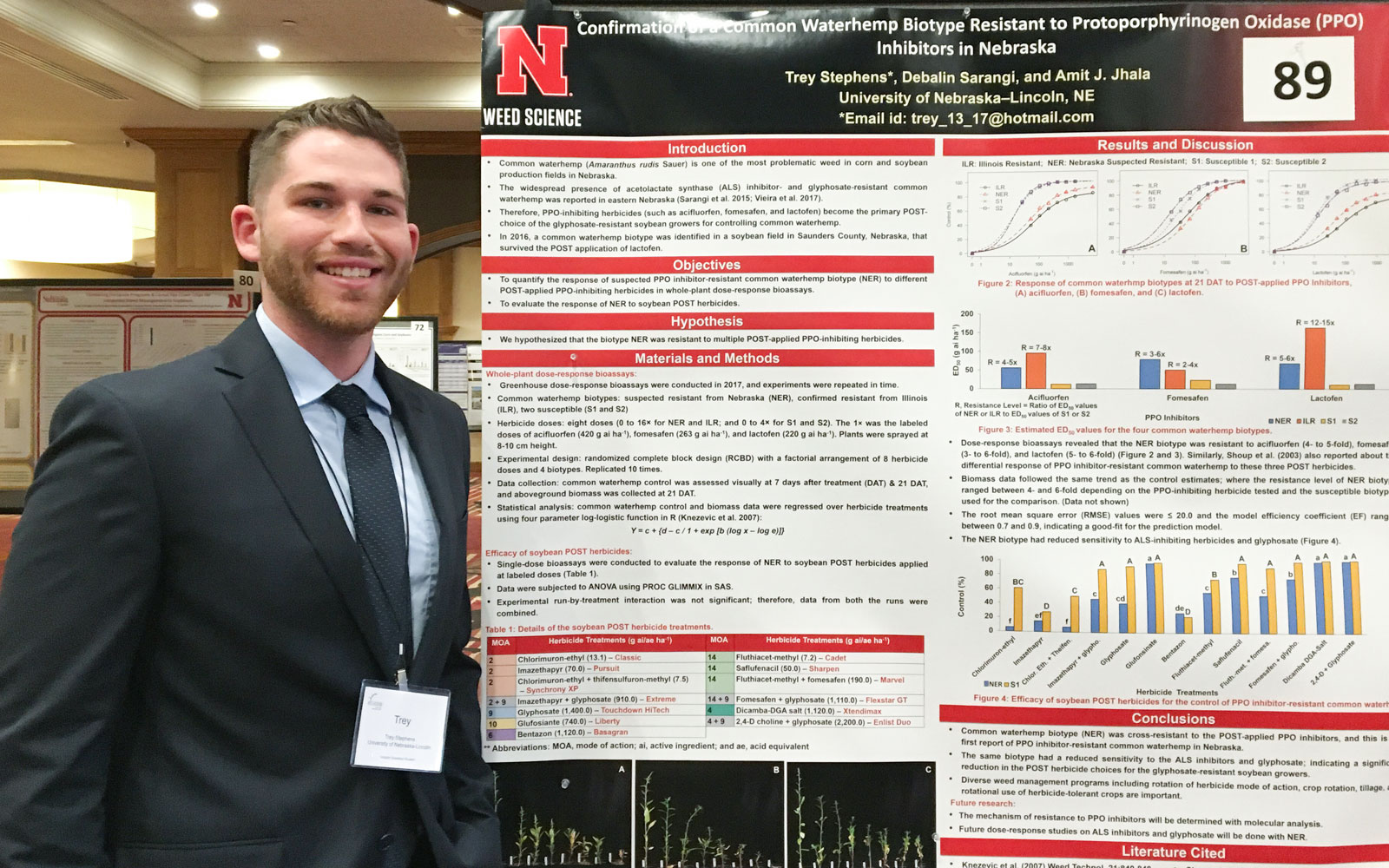
Nine Department of Agronomy and Horticulture students took top honors at the 2017 North Central Weed Science Society Annual Meeting in St. Louis Dec. 4-7. The nine include graduate students Ethann Barnes, Parminder Chahal, Maxwel Coura Oliveira, Alexandre Tonon Rosa, Bruno Canella Vieira, Adam Striegel and Don Treptow and undergraduate students Trey Stephens and Barbara Vukoja.
Barnes, agronomy doctoral student specializing in weed science, received first-place in the Research video contest and second-place in the Weed Biology, Ecology and Management graduate student paper contest. His video title was "Critical Time of Weed Removal in Popcorn (Zea mays everta) as Influence by Pre-Emergence Herbicides". The title of his paper was "Modeling Emergence Pattern of Common Ragweed Influenced by Spring Tillage in Nebraska".
Barnes' doctoral research focuses on multiple aspects of popcorn production in Nebraska including herbicide sensitivity, weed control and pollen-mediated gene flow from field corn to popcorn.
Amit Jhala, assistant professor and Nebraska Extension weed management specialist, Nevin Lawrence, assistant professor and extension integrated weed management specialist, and Stevan Knezevic, professor of integrated weed management are Barnes' advisors.<
Chahal, agronomy doctoral student specializing in weed science, received the 2017 NCWSS Outstanding Graduate Student award for distinguished achievements in weed science in the north central region. This award recognizes one outstanding graduate student who is a NCWSS student member, who is actively involved in the society and is a contributor to the field of weed science through extension, research and teaching.
Chahal also received second-place in the Research video contest. His video was titled "Corn response to DiFlexx DUO applied at different corn growth stages".
Chahal's research focus is on the effect of water stress on the growth and fecundity of Palmer amaranth, the basis of synergism of atrazine and HPPD inhibitor herbicide combinations on atrazine- and HPPD inhibitor-resistant Palmer amaranth and on the management of atrazine- and HPPD inhibitor-resistant Palmer amaranth in corn. He is advised by Jhala.
Oliveira received first place in the Herbicide Resistance graduate student poster contest. His poster title was "Inheritance of Mesotrione Resistance in a Waterhemp Population from Nebraska."
Oliveira's research focus involved determining the mode of inheritance – recessive, semi-dominant, or dominant – and how many alleles control mesotrione resistance in a waterhemp population from Nebraska. Earlier results have shown that mesotrione is semi-dominant and that multiple alleles are likely to confer mesotrione resistance in a Nebraska waterhemp population.
Oliveira received his doctorate from the University of Nebraska-Lincoln in December 2017 and was advised by Knezevic. He is currently a weed scientist research and outreach associate postdoc at the University of Wisconsin-Madison.
Tonon Rosa, agronomy doctoral student specializing in crop physiology and production, received a NCWSS Travel Award. He was advised by Rodrigo Werle, now an assistant professor of agronomy at the University of Wisconsin. Tonon Rosa is now advised by Roger Elmore, professor of agronomy at Nebraska.
Tonon Rosa's research is focused on cover crop management in rainfed cropping systems of western Nebraska. He is evaluating the effects of cover crops on soil water use, weed suppression, nutrient dynamics and subsequent corn productivity when cover crops are planted after winter wheat on a traditional wheat-corn-fallow rotation. Results from three studies looking at different cover crop species, cover crop planting and termination times and the combination of cover crops with different wheat stubble cutting heights will be the basis of recommendations for cover crops management under rainfed cropping systems of semiarid Nebraska and much of the Great Plains.
Vieira, an agronomy doctoral student, received first place in the Weed Biology, Ecology and Management graduate student paper contest. The title of his paper was "Weed Exposure to Sublethal Rates of Herbicides as a Result of Pesticide Drift."
Vieira's research is focusing on how incorrect herbicide application practices can affect herbicide resistance in weeds. He is investigating if exposure to herbicide drift can influence herbicide resistance evolution on weed populations located on field borders. He is advised by Greg Kruger, associate professor of agronomy.
Striegel is a second-year Doctor of Plant Health student and an agronomy master's student specializing in weed science. He received second place in the Cover Crops graduate poster contest with his poster titled "Combining Herbicide Programs and Cereal Rye Cover Crop for Integrated Weed Management in Soybeans." Striegel is advised by Jhala and Gary Hein, director of the Doctor of Plant Health Program.
Striegel's research is focused on weed control in soybean. He also prepares the undergraduate crops judging team for the North American Colleges and Teachers of Agriculture affiliated contests.
Treptow, an agronomy master's student specializing in weed science, received second place in the Weed Biology, Ecology and Management graduate paper contest. His paper title was "Post-Dispersal Seed Fate and Time of Emergence of Johnsongrass in Nebraska."Treptow is advised by agronomy professor John Lindquist.
Treptow's research is focused on understanding different aspects of the demography of Johnsongrass found throughout the Midwest region including density-dependent seed production, seed fate in the soil, seedling emergence, rhizome production and rhizome winter survival. This information will be used in a risk-assessment model simulating Johnsongrass population dynamics under different crop rotations and herbicide programs.
Vukoja, an agronomy major, received second place in the Equipment and Application Methods undergraduate poster contest. The title of her poster was "Impact of Droplet Size on POST Applications of HPPD Inhibiting Herbicides." Vukoja is advised by Kruger.
Stephens received first place in the Agronomic Crops undergraduate poster contest. His poster title was "Confirmation of a Common Waterhemp Biotype Resistant to Protoprphyrinogen Oxidase (PPO) Inhibitors in Nebraska."
Stephens' project confirmed that a population of Common Waterhemp found in Saunders County was resistant to protoporphyrinogen oxidase inhibitors. It is the first reported PPO resistant population in Nebraska. Greenhouse studies were done to test the resistance levels of this population.
Stephens graduated with a bachelor's degree in agronomy Dec. 2017. He is currently a master's student advised by Jhala. His graduate research focus is on glyphosate-resistant Palmer amaranth control in soybean.
More details at: https://go.unl.edu/ophs